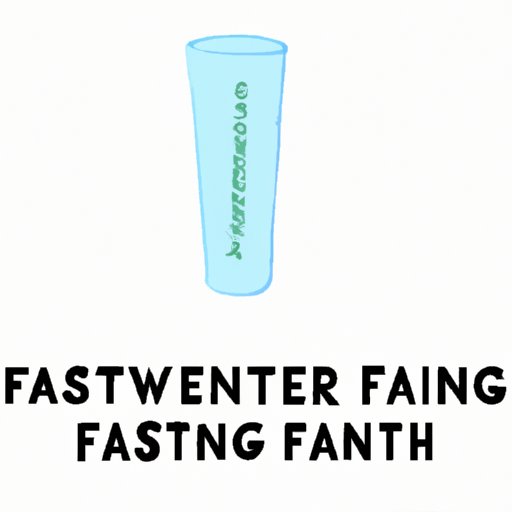
Introduction
Fasting is an ancient practice that has been around for centuries. It involves the restriction of food and sometimes water for a certain period of time for spiritual, health, or weight loss reasons. Water is essential to life, and proper hydration is crucial for overall health. But, what if you’re fasting, and you need to drink water? In this article, we’ll explore when you can drink water during fasting, its benefits and drawbacks, and how it affects the fasting process.
The Science of Fasting: Can Water be Consumed During the Process?
Fasting is the process of restricting calories or abstaining from food for a period of time. The body depends on glucose for energy, which it gets from the food we eat. When we fast, the body’s glucose stores are depleted, and it begins to utilize stored fat for energy.
Drinking water is crucial for overall health, and even more so during fasting. Without adequate water intake, the body can become dehydrated, leading to headaches, fatigue, and other health complications.
Breaking Down the Rules of Fasting: Water Intake Allowed or Not?
There are many different fasting practices, each with its set of rules and guidelines. Some people fast for religious or spiritual reasons, while others do it for health reasons, such as weight loss or detoxification. Here’s a breakdown of some common fasting practices and their rules about water intake:
- Water fasting: Water fasting is the strictest form of fasting, where one only consumes water for a certain period of time. Water fasting requires drinking water only and avoiding all other liquids, including tea, coffee, or even juices.
- Intermittent fasting: Intermittent fasting involves restricting food intake for a set period, typically 16-24 hours. During intermittent fasting, water is allowed, and in fact, necessary to stay hydrated during the fast.
- Alternate-day fasting: Alternate-day fasting involves fasting every other day. On fasting days, water is allowed, but it’s important to maintain proper hydration throughout the day.
- Partial fasting: Partial fasting involves restricting food intake but consuming some calories during the restriction period. During partial fasting, drinking water is allowed.
Hydration vs. Fasting: Where Do We Draw the Line?
Hydration is essential for overall health, and even more so during fasting. When we fast, our bodies lose water faster than usual. Therefore, it’s crucial to stay hydrated and drink enough water to avoid dehydration.
The key is to balance hydration and fasting. Drinking too much water can hinder the fasting process by increasing urination and delaying ketosis—the process where the body begins to utilize stored fat for energy. On the other hand, failing to drink enough water can lead to dehydration and other health complications.
Fasting Myths and Facts: Separating Truths from Fiction
There are many myths surrounding fasting and water consumption. Here are some of the most common ones and the facts behind them:
- Myth: Drinking water during fasting breaks the fast.
- Fact: Drinking water during fasting is allowed in most fasting practices and is necessary for proper hydration.
- Myth: Drinking too much water during fasting can be harmful.
- Fact: While staying hydrated is crucial during fasting, drinking too much water can dilute the body’s salt content, leading to a condition called hyponatremia.
- Myth: Fasting can lead to dehydration.
- Fact: Fasting can lead to dehydration if adequate water intake is not maintained during the fasting period.
Different Types of Fasting: Which Ones Allow Water Intake?
There are many different types of fasting, each with its set of rules and guidelines regarding water intake. Here’s an overview of the most popular types of fasting and their rules on water intake:
- Water fasting: As the name implies, water fasting only allows the consumption of water and no other liquids or food.
- Intermittent fasting: During intermittent fasting, water is allowed and encouraged.
- Alternate-day fasting: On fasting days, water is allowed and necessary for proper hydration.
- Partial fasting: Drinking water is allowed and in fact necessary during partial fasting to maintain proper hydration.
Experts Weigh In: Can Water Consumption Enhance or Hinder the Fasting Process?
Experts are divided on the issue of water consumption during fasting. Some say that drinking water can enhance the fasting process by reducing hunger and keeping the body hydrated. Others suggest that excessive water consumption can dilute the body’s salt content and hinder the fasting process.
However, most experts agree that proper hydration is essential during fasting, and avoiding dehydration should be a priority. Drinking enough water during fasting can help maintain electrolyte balance, prevent headaches, and keep the body functioning optimally.
Conclusion
In conclusion, water consumption during fasting depends on the type of fasting you’re doing. While specific guidelines differ, staying hydrated during fasting is essential. Drinking enough water during fasting helps avoid dehydration, headaches and keeps the body functioning optimally. Remember to listen to your body and find the balance that works for you as what works for someone else may not work for you. We hope this article provides you with the knowledge to make informed decisions during your fasting journey.




